Gennady Herman worked at the Office of the Prosecutor General of Ukraine and headed the Mykolaiv Regional Prosecutor’s Office in March 2021. The prosecution alleges that in early March 2022, he contacted a representative of a Russian media outlet, expressing a desire to cooperate. Subsequently, through this intermediary, he allegedly began receiving assignments from Russian special services and transmitting them sensitive information.
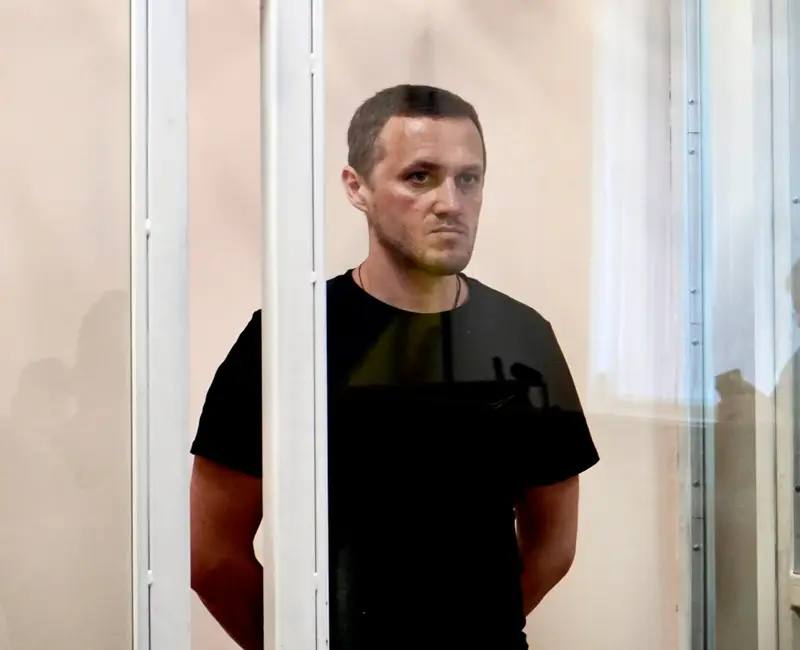
The prosecution identified the Russian media figure as blogger Yuriy Podolyaka, who “actively cooperates and exchanges information with representatives of Russian military formations and special services.” According to the investigation, no later than March 13, 2022, Podolyaka, on the orders of “Lieutenant Colonel of Russian Military Intelligence” Igor Bezler, began “actively searching for, selecting, and preparing an agent network from among his channel and media platform viewers—Ukrainian citizens, Ukrainian Armed Forces servicemen, and representatives of state and law enforcement agencies who shared his pro-Russian views and would agree to carry out tasks set by him and his handlers, to the detriment of Ukraine’s national security and in aid of Russia’s aggressive war against Ukraine.”
From March 15 to April 4, 2022, Herman allegedly sent Podolyaka several files containing personal data of Russian servicemen captured by Ukraine, information on the number of deceased servicemen, police officers, and civilians in the Mykolaiv region. Herman was the procedural prosecutor in the case of the mass deaths of Ukrainian military personnel and civilians in the early days of the war and therefore had access to such data. The files also included his personal observations regarding the work of law enforcement agencies in the region, the socio-economic and operational situation in the city—the condition of bridges, traffic congestion on main roads, the sentiments of current and former law enforcement officers, and similar information.
Herman was detained on April 4. The following day, he was charged under Part 2, Article 111 of the Criminal Code of Ukraine (treason under martial law), and on April 6, he was remanded in custody.
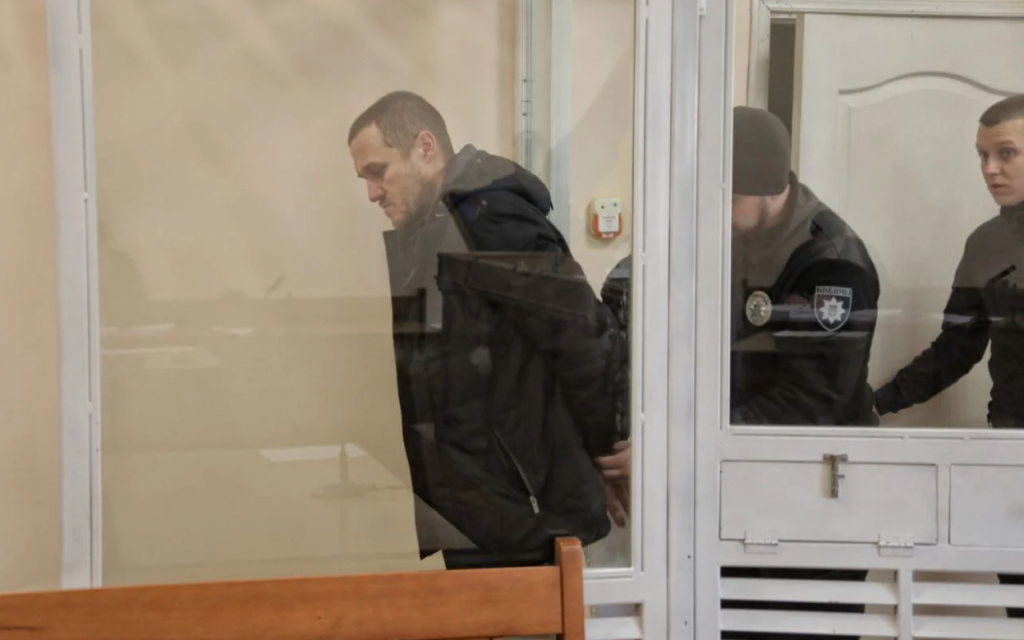
The criminal case against the prosecutor was opened on March 15, 2022, the same day he allegedly first passed information to Podolyaka. Monitoring of Herman (information was extracted from his Telegram messenger and his correspondence reviewed) began even earlier—when he allegedly first contacted Podolyaka. However, the start date of their communication is unknown to investigators: “in early March 2022, but no later than March 15, 2022.” This discrepancy is unclear. If the SBU had the ability to monitor Herman and Podolyaka’s correspondence, why is the start date unknown? Especially considering the indictment details specifics that would be impossible to know without knowing the date:
- Herman learned from a video on the “World with Yuriy Podolyaka” channel that Podolyaka was linked to Russian special services and carried out their instructions (which videos are not specified);
- Herman, on his own initiative, asked the channel administrator for Podolyaka’s contact information;
- Having obtained the contact, Herman offered his services to provide military and operational information about the situation in Mykolaiv city and region.
How the SBU learned to monitor Herman is not disclosed. It is also unclear how the SBU knew to hack Herman’s Telegram on the very day he began communicating with Podolyaka.
On April 4, the day of the arrest, SBU investigators created so-called simulated documents—a fabricated list of four deceased Ukrainian soldiers and information about the work of the State Emergency Service in the Mykolaiv region. To deliver these to Herman, a leader of the Mykolaiv police and an official from the local State Emergency Service were used. The question arises: why was a provocation and subsequent arrest necessary if the investigation had already recorded repeated instances of information being passed to Podolyaka since March 15? The protocols of investigative experiments indicate that provocations were carried out repeatedly, at least since March 24.
Here is Herman’s explanation:
- After the start of hostilities, he remained at his workplace in Mykolaiv.
- He created a Telegram work group including prosecutors from across the Mykolaiv region. In this group, they provided each other with moral and financial support and attempted to ensure the functioning of the prosecutor’s office.
- The regional authorities tasked the prosecutor’s office with collecting information on war crimes (deceased military personnel, civilians, and destroyed infrastructure). This information was gathered through government agencies, the police, and other prosecutor’s offices.
- Herman was appointed the procedural prosecutor in several criminal proceedings related to the deaths of military personnel and civilians, but he never had access to information about the locations of the Armed Forces of Ukraine and never passed any such information to anyone.
- Herman does not know Podolyaka and had no correspondence with him.
- Herman believes that unauthorized individuals had access to his phone and laptop (which were not password-protected).
- Herman believes that the messages allegedly from Podolyaka could have been sent by SBU officers. The provocations involving the transfer of fictitious data only confirm the possibility of this scenario.
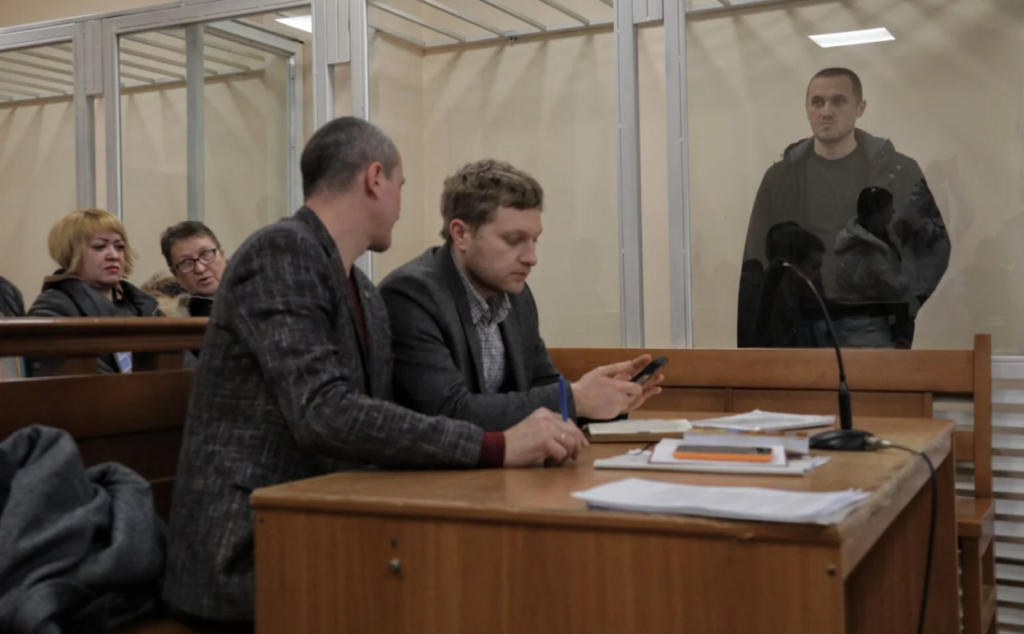
The Deputy Head of the Investigative Department of the Police (ISU GUNP) of the Mykolaiv region stated that he had not contacted Herman but knew that the prosecutor was the procedural supervisor in many criminal proceedings and had access to information about the number of deaths in Mykolaiv and the region. In the second half of March, SBU officers contacted the witness and instructed him to create simulated materials about the deaths of four fictitious soldiers, which he passed to Herman on March 24 via the Signal messenger.
The deputy head of the criminal investigations department for crimes against life, health, and sexual integrity at the Main Directorate of the National Police in Mykolaiv Oblast regularly communicated with Herman, as he—acting as the procedural prosecutor—authorized burials and cremations of military personnel. On March 24, the witness sent the accused a list of deceased soldiers via WhatsApp. Four fictitious names were included in her lists, though she was unaware they were fabricated.
The head of the State Emergency Service department in the Mykolaiv region reported that he met the accused on April 2nd, 2022 (two days before his arrest). On April 3rd, he sent Herman information about explosive devices in the region via WhatsApp. He was then summoned to the SBU (Security Service of Ukraine) and ordered to alter the sent information to make it false, which he did.
The prosecutor of the Mykolaiv Regional Prosecutor’s Office stated that Herman did create a Telegram group, where he requested that non-public information be sent in private messages. In her opinion, Herman summarized the received data and forwarded it to the General Prosecutor’s Office.
Witness testimonies clearly show that Herman collected the information he was supposed to collect as part of his duties. There is no evidence of the accused cooperating with Russian special services. However, some witnesses were involved by the SBU in a provocation—the creation and transmission of simulated materials.
The indictment states that the simulated materials were transferred to Herman on March 24th; Herman passed them to Podolyaka, and Podolyaka to Bezler, who, in turn, passed the data to “other individuals not identified during the pre-trial investigation.”
The first point highlighted by the defense attorney, Stanislav Klimenko, is that the transfer of information constitutes treason only if that information constitutes a state secret. If it concerns official information, the offense should be qualified under Article 330 of the Criminal Code (transfer or collection of information constituting official information gathered during operational-search, counter-intelligence activities, in the sphere of national defense). The penalty is a maximum of 8 years; life imprisonment is not a possibility. In response, Prosecutor Andriy Milevskyi stated that Herman is not charged with treason in the form of espionage, but with aiding a foreign state in subversive activities against Ukraine. What this means is unclear; the legislation lacks criteria defining what constitutes “subversive” activity against Ukraine, meaning the SBU and the prosecution have approached the matter arbitrarily, violating the principle of clarity and predictability of the law. Surprisingly, Prosecutor Milevskyi himself admitted in the debate that subversive activity is a subjective assessment, yet somehow believes that guilt of treason has been proven.
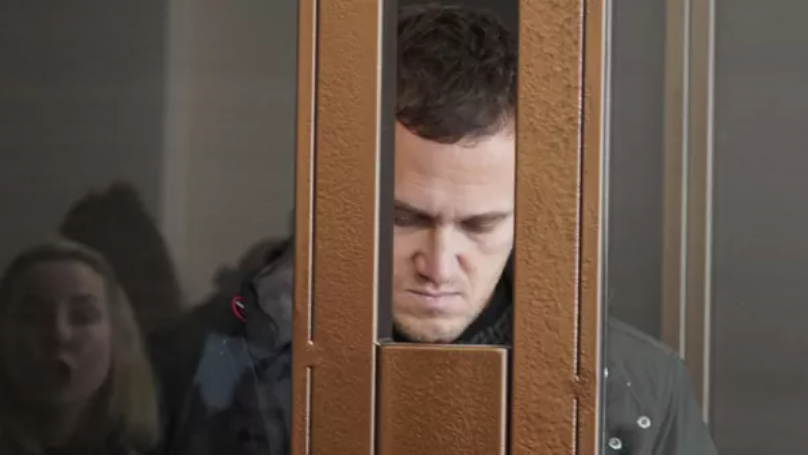
The second point the lawyer highlighted is the identity of the blogger Podolyaka. As previously mentioned, the method by which the SBU learned about the alleged correspondence between Herman and Podolyaka is classified. However, the blogger was verified as an agent of Russian special services based on data from the “Myrotvorets” website, registered outside Ukraine, which cannot be verified. Proof of the blogger’s work for the Russian special services should be a document, which is absent from the case.
The third point is the lack of direct evidence of Herman transferring any information to Podolyaka. Examination of the mobile phone did not confirm the existence of their correspondence in a question-and-answer format. The mere presence of files on Herman’s device, which, according to the prosecution, were later passed from Podolyaka to Bezler, cannot prove their transfer to Podolyaka. During the pre-trial investigation, 23 more people were identified who had access to this information, but the prosecution chose not to question them in court.
The fourth point concerns Bezler. The case files do not explain how it was established that Podolyaka passed information allegedly received from Herman to Bezler. What proves that Bezler is an active “Lieutenant Colonel of Russian military intelligence”? What proves that the “unidentified individuals” who allegedly received the data from Bezler work for Russian special services? Even assuming the connection between Herman and Podolyaka is proven, the entire subsequent chain is based on speculation and lacks any confirmation.
The fifth point concerns the consequences. At the end of November 2022, the court closed the proceedings to protect the personal data of individuals. However, the proceedings were reopened at the request of relatives of soldiers killed in a missile strike on the barracks of the 79th Separate Airborne Assault Brigade of the Armed Forces of Ukraine in Mykolaiv on March 18, 2022. Since then, relatives with portraits of their deceased have been attending court hearings and publicly accusing Herman of the deaths of their relatives, although the case contains no such information; no one has been able to connect the barracks attack to the accused’s activities, and no victims are listed in the case. Moreover, the court received three requests from relatives of the deceased to be recognized as victims in the case, but the court refused.
“Herman is not involved in the shelling of barracks or the adjustment of missile fire on any objects,” explained lawyer Klimenko. “He is accused of transferring personal data of the deceased, concerning prisoners of war from the Armed Forces of the Russian Federation and passwords at checkpoints.”
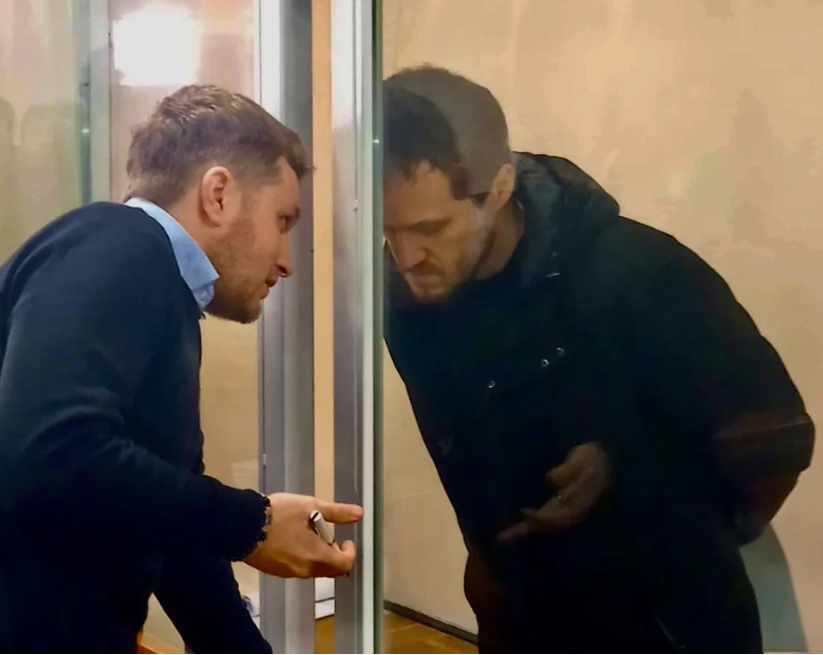
Among other attendees were activists from the Viber group “Revenge on Traitors.” They threw raw eggs at the “aquarium” containing the accused and demanded his execution in prison.
At a hearing in late February 2023, Prosecutor Oleksandr Choklya again tried to persuade the court to switch to a closed hearing, as information about individuals involved by the SBU in the provocation against the accused appeared in the media after the previous hearing. The judge stated that the prosecutor himself was responsible for the disclosure and should not “look for scapegoats.” When asked which materials in the case are classified, the prosecutor replied that the classification had been removed from all materials, but that four volumes of the case contain the results of covert investigative actions (CIA) of the SBU, and the records of covert information gathering methods, in the prosecutor’s opinion, should not be made public. As a result, these records were reviewed in a closed session on March 8th, and the public remains unaware of how the SBU learned all of the above.

However, the material examined in the open session is also highly revealing. For example, the interrogation protocols of the victims (who are not in the case), protocols of identification of the blogger Podolyaka by certain individuals, copies of his passports, information about the sale of his apartment, some publications, protocols of the examination of the Internet from 2017, which are not related to Herman at all. When asked by the judge whether the accused recognizes Podolyaka, the prosecutor replied that such an investigative action was not carried out. The prosecution presented roughly similar materials regarding Ihor Bezler, but what is the connection between the accused and these peo
The whereabouts of his accomplices are unknown. Satellite communication operator data regarding calls from Herman’s mobile phone revealed absolutely no contact with Russian subscribers. However, when asked about specific individuals (Podolyaka and Bezler), the prosecutor was unable to explain this information. He stated that Herman’s correspondence with Podolyaka is contained in the case files that are to be examined in a closed session. Public access to this data is restricted, making it impossible to evaluate.
At the end of June 2023, Gennady Herman was sentenced to life imprisonment with confiscation of property. On August 7, 2024, the Odesa Court of Appeal upheld the sentence.
This translation was made using a neural network. If you find any inaccuracies, please contact us.


